Against ‘Impact’: how the language of 'care' is making a comeback.
'Impact' and 'outcomes' are giving way to a language of love, care, and hope in charities and non-profits. Why?

Hello everyone, and welcome to another week of Barely Civil Society. I hope you’re all getting some kind of break over the summer. I’m off for two weeks at the end of September, just in time to miss the restart of the consultancy market. I’m good at this, see?
As for the personal bit this week. Well, after my dental surgery, things are mostly healing except for a terrible side effect: it hurts when I laugh. Those of you who know me will know I’m a terrible giggler, so every time I have a meeting with people I like, I’m in bloody agony. So if you see me popping two ibuprofen when we’re speaking, it’s not you.
Quick plug: Meanwhile I’m really enjoying my work at the moment. More learning and development, running the next year of the leadership programme run by a grantmaker for small charity leaders. Working with one of the bigger CVSs on developing a new strategy and a change programme. And continuing community regeneration work in Bermondsey, plus with another community centre in North London. More evaluation coming up! I love it all. Let me know if you’d like a chat about any help I can give you. I’ve got space from October. Check out my day job website.
How often do you want to hear from me?
I’m aware that the length of these posts might make their frequency excessive (for your sanity and mine). Can you answer this poll to help me get it right?
This week….
We’re looking at changing words in the charity sector again. There are links here with wider debates happening on Substack, for example in the work of US philanthropy expert Jason Lewis and UK fundraising diva Joanna Jeffery, whose updated briefing on charity closures is coming in September. You might also want to follow the absurdly named Alex Evans whose ‘Good Apocalypse’ blog touches on many of the things I go on about here, and much more. (This isn’t a joke, he really is also called Alex Evans and it’s frankly confusing when we communicate.)
And of course, there is a wider debate opening up in the face of crisis in the nonprofit world on both sides of the Atlantic. This changing and developing discussion is happening between those looking, as Jason puts it, to reform, and those looking to essentially rebuild as is. Those highly protective/ conservative voices seem to me to be increasingly on the defensive - probably a good sign. There is also something of a generational shift happening, I think.
The big essay: In our own words
“Neoliberalism, in other words, has neither an effective practice of, nor a vocabulary for, care.” - The Care Manifesto, The Care Collective, 2021
I recently began a learning session with a new group of charity leaders by asking them to talk about a time when they saw something powerful happen for somebody their charity/ nonprofit helped. I wanted to hear about a moment when they had thought to themselves: ‘Wow. That’s what it’s about.’ I warned them: this is not a test for a commissioner. The minute I heard hushed pairs of voices turn into a sales pitch about positive outcomes, I bellowed a reminder: "Tell me what happened for you. What happened for the people you helped. Why it mattered. In your own words.”
I’ll give you some of the kind of things people talked about.
“They ate with us…” “We sang together…” “We felt something magic” “it’s about being there” “people knowing you care” …“friendship” ….“journey” …“family”.
There were big ideas. Words we’re discouraged from using. “We gave someone hope”. “They felt loved”. “Nobody cared before.” Every one of these was something ‘felt’, by the way.
The stories they told were inspiring - coming from organisations supporting older people, often towards end of life, the ‘outcomes’ were often not as we might want. Somebody had finally arranged and planned a visit from recently reconnected loved ones abroad. Sadly, this person’s condition had worsened and they had died before the practical solution came. But even the idea had given them ‘hope’. Somebody had cancer and their health worsened - but reconnected to those around them, they felt part of a community. And then there were the moments of exuberance, spontanaiety and joy: I mean, you know, 300 people came to a community party and danced together.1
As they told these stories, the hairs on the back of my neck stood on end. And I noted, happily, how clearly connected these very senior people felt to their work and what mattered to them. The reason I asked the group the question I did, is because alienation from values is known to be one of the things that reliably predicts burnout for people in the caring professions. The Sisyphean task of what we do becomes meaningless drudgery – an assault on the body and emotions – when we lose the power to make sense of it.
I think a lot of the problem we are experiencing as a workforce in the charity sector is ‘alienation’: from our labour itself, and from the things we create. Things like love, hope, care have to be taken away from us and transformed in some way into the domain of the people holding the power and money. We lose ownership of our labour and our organisations. And we lose the very words that help us make sense of what we do and why.
After the discussion, I turned to my colleagues and reflected immediately: '“Doesn’t it seem sad somehow that all of the things people ‘reported on’ then and there are things that it would be very hard to imagine ‘capturing’ in our professional discourse?” At best, somebody would come in, listen encouragingly to these stories and then say, “Lovely. Anyway, let’s turn those into proper metrics.” Out comes the set square and spreadsheet.
Most likely these stories might appear in a few ‘case studies’ rendered as bloodless as possible and appended, to give it some colour. And don’t forget the odd picture of children with finger paint, or old people looking at computers.
Why is that, I asked? ‘They don’t fit in a spreadsheet’, somebody responded. This was intended as a flippant aside, but they had actually hit the nail on the head. In most situations, there would literally be no way to transmit these experiences to power: they would not fit in the spreadsheet or application form. Every part of the discourse had already been planned and set up to ensure that those things cannot be comprehended or even ‘captured’ as we say these days. (What does that word tell us about power?)
Of course, a colleague - rightly - immediately pointed out that with the right support from an impact expert, these things could be captured and measured. It would even be possible, with the right level of expertise, to turn these outcomes into things with financial values attached.2
All true. All often necessary. And all part of the problem.
Some years ago, we were once trying to persuade people to frame their ‘professional’ language in the discourse of instrumentalism and industry, metrics and measurement. Now, we have spent so long learning that we have to ‘speak spreadsheet’, that some of us can barely speak any other way.
Big words are coming back
For some time now, the biggest words we were allowed were things like ‘impact’. ‘Change’. ‘Transformation’. ‘Value’. ‘Positive Outcomes.’ ‘Innovation’.
But recently, I’ve started to see the return of some other words. ‘Community.’ ‘Hope.’ ‘Care.’ Even, whisper it, ‘Love’.
Innovations consultancy Good Innovation’s report exploring Radical Hope. Jason Lewis drawing people back to the power of ‘the gift’. Manifestos about ‘care’. Me going on about love and freedom.
Because aren’t these words foolishly abstract? ‘Define community!’ they will shriek. Too big to be meaningless? ‘You can’t measure love!’ ‘That’s all very nice, but how to define them? Let’s be professional.’3
You see, I don’t think that’s a problem. We need ‘big’, ‘grand’, ambitious words. And we’ve been very comfortable some of them. Again: ‘Change’. ‘Impact’. ‘Value’. Add ‘social’ on the front, so people can see you’re not just a hedge fund. We’ve got used to talking in very abstract concepts. Abstraction is not the problem.
Words like ‘impact;’ have very limited content: they’re just descriptions of elements in processes. They’re placeholders for something. These are instrumental concepts.
‘Impact’ could be what cancer has on your family. ‘Change’ could be the removal of the welfare state. Sometimes we qualify these big words with words like ‘good’ or ‘positive’. Again, no moral or ethical content. ‘Improved mental wellbeing’ - okay. But in what way? Why?
But words like love, hope, care, freedom, community, all have a profoundly moral and ethical content. They speak of values. When someone says they care passionately about ‘impact’ or ‘social change’, I don’t think they do. You might say they believe those are instrumentally valuable - but they are not the goal. I think we’ve been en couraged to end our conceptions of our work at the level of instrumental value, not values, or indeed, the thing we are working towards.4
The power (and perils) of translation
I had some good conversations this week with two different charitable funders. We talked about the difficulties with words, concepts, and the need to fit ourselves into frameworks.
And yet there is an inescapable reality that the funders and I agreed on - we are often trying to make it possible for the organisations we fund to speak that language. As both pointed out to me, they know that many of the charities they support are having to make their case to health commissioners, local authorities, or corporate foundations, or even the less enlightened trusts (they think it’s the other way round). They’re right to do it. This is how power works.
The work many of us are doing - especially as consultants, or ‘impact specialists’ or whatever, is a translation service. We’re offering to speak discourse on people’s behalf, or to give them the discursive skills of their own, to speak to power. This is especially the case when we work with care-focused charities, and with community-based, perhaps smaller organisations. We’re offering access to the language of dominant ‘discourses’, and to the concepts through which the powerful conceive of, and manage, the world.
So when we have pushed our own charities, or the charities of others, in this direction, I think there have been several different rationales. One is that we are constantly told that charities are so diffuse and diverse that nothing but the highest levels of instrumental concepts could do the job of linking them: the ‘impact’ or ‘social change’ sectors, for example.
But I also think there has been some canny political manoeuvring here. The sheer level of ideological bend we’ve seen in the sector over the last few years has meant we have needed to sell ourselves in a way that sterilises what we do of any specific ethical or value-based content. This is part of the process of trying to shift descriptions of what charities/ nonprofits do into a service mentality where we provide ‘impact’ or ‘value’ which is then to be put to any use decided by the holder of the money. There is a danger here that our actual goals then become instrumental, rather than ends in themselves. These are technocratic terms which are open to any interpretation - or perhaps, any service which might be commissioned.
[Note here: some have taken to using the ‘For impact’ sector as a term. No shade here: as the fab Felicia Willow points out, ‘For impact’ is designed to be different from ‘For profit’. Makes a lot of sense. She also threatened to do me over when I criticised it in a previous post, so I’m being careful.]
Once translated they become so eminently transportable because they have been neutralised, one might almost say “neutered,” stripped of context and value. We’ve drained the words we use to describe our work of ethical content, in order to make ourselves more commissionable. If we obscure the end goal, we make it flexible enough that we can sell those processes to power, whatever their own particular interest or ideology. The discourse is sufficiently bloodless and content-free that we avoid commitment to specific battles.
Analysis of instruments and process goals like ‘change’ don’t tell us what ends these things are to be put to. This is a product of instrumental reason. Horkheimer sets this out in ‘The End of Reason’:
“Its features can be summarized as the optimum adaptation of means to ends, thinking as an energy-saving operation. It is a pragmatic instrument oriented to expediency, cold and sober.” (Max Horkheimer, The End of Reason, 1947)
As Marcuse puts it in his own work on instrumental reason, it may be instrumental towards a goal, but what is the goal? What is the instrument being used in aid of?
“In this reality, objectivity has neither a telos in itself nor is it structured towards a telos.” (Herbert Marcuse, One Dimensional Man, 1964).
Telos means ‘end goal’. What both are saying is that such high levels of instrumental ‘reason’ and rationality don’t tell you anything at all about the end they are put to. They go further: that there is always a danger that the structures and shapes of instrumental reason themselves will start to shape what you do, and can end up with goals of their own, even if they are invisible. For example, we might talk about the ‘objectivity’ of impact measurement by numerical, and usually financial, value. But how is this without ideology? The very ‘rational’ process of judging that way has an end embedded - the logic of the market, and the values of neoliberal financial calculation.
Discourse is power: Foucault and Spivak
At this point, let’s be clear: this is not a critique of people slogging their guts out helping charities measure their impact - I count them among my most valued colleagues. But we also need to be self-aware that this is a professional service we offer within an industry, not a way of reaching an absolute objective truth. And there is always a danger that our translations change nothing of the actual dynamics of power in knowledge. What we’re offering is access to a language, to a discourse - and discourse, as Foucault showed, is power. Now let’s be clear, ‘discourse’ isn’t about ‘words’ alone. It’s about all the ways of ‘talking about,’ conceptualising, and framing our knowledge, or the subjects of it. Think about medical ‘discourse’ or religious ‘discourse’. If I tell you that your colon is possessed by demons, or that the Holy Trinity is a hermaphroditic, conjoined triplet, I’ve got my discourses mixed up. I’m also likely to be removed from the room. That, indeed, is what happens when you step outside the dominant discourse. Pretty quickly, they will shut you out, or call the police. You can’t speak, or even think that way here. Move along. (Meanwhile, don’t worry: your colon is not possessed by demons; that’s just what working in a charity does to your digestive system.)
A graph is a just as much part of a discourse as a word. And the whole concept of ‘measurement’ or ‘social impact’ is part of a discourse - ways of speaking that denote what we can discuss, and how we can even think about things.
This touches on another idea - ‘epistemic violence’. This is critical theorist Gayatri Spivak’s term, from her 1988 essay, ‘Can the Subaltern Speak’. ‘Epistemes’ are particular framings or domains of knowledge (hence ‘epistemology’ - the study of types of knowledge and what can be known). Her ideas about epistemic violence build on, and in some ways challenge, Foucault’s ideas about ‘subjugated knowledge’ - ways of ‘knowing’ that are ‘subjugated’ by dominant discourses. Spivak pushes Foucault further. She argues that even attempts to ‘give voice’ to the oppressed can just end up reinforcing the structures that silence them. When people with power say they speak for others, they tend to overwrite the very voices they mean to centre. The result is what she calls a kind of ‘epistemic’ violence – a sort of erasure of knowledges, and ways of speaking or understanding that don’t fit the dominant frame.5
Getting the resources we need to achieve our goals relies heavily on our ability to speak the language of the dominant forces of our society, especially financially. So again, the point is, those who focus on ‘impact’ measurement (and I include myself in this) are in many ways translators. Our role is to find a way for values and terminologies indigenous to the charity sector to be translated into the language of the dominant discourses of instrumental reason. But the fact that translation is necessary tells a lot about who is in charge, and what really matters. I’d be pretty clear about the fact that there is a dividing line here: plenty of people are translators with the best of intentions, who recognise and are fully self-aware in the process. But there are some who tend to simply continue, replicate, and often benefit from, the imbalance of power. They truly believe they are uncovering the ‘truth’ in a more ‘objective’ voice. Many simply believe that their offer to ‘translate’ for charities and the experiences of the people they work with is a kindness to those who could never be trusted to speak for themselves.6
What I would say is: when I prompt even elevated, managerially ‘distant’ CEOs in charities to talk about the difference they made ‘in their own words’, it’s rare that they choose the language of impact and outcome. And alongside the work of directly participatory methods, I think much has to be done with the discourses we use.7
Catching feelings
Back to what I think is changing and, I think, rightly. Alongside ever increasing drives toward instrumentalised, alienated and industrialised, managerialist concepts of our work, I’m seeing a counter-movement emerging, one that is shifting discourse from process and technocratic terms to value-based terminologies. Part of reclaiming charity - or care, caritas, etc - is owning the cultural, ethical and morally loaded, intangible abstracts we recognise through language. My sense of a return to these words is being driven by hearing what we hear every day from the people we work with, through our own capacity for empathy, and from our own life experiences.
Somebody at the back there just rolled their eyes. We’ll have words later, but let me address this right now. You’re asking, aren’t we just being sentimental? Well, it’s interesting that we’ve come to eschew ‘sentiment’ - otherwise known as having emotions - in the ways we talk about our work in ‘professional’ settings. That seems unhealthy to me, and far from helpful (and indeed, there is research that suggests it may be damaging to mental health - more another time). And the kind of words we use, just because they seem emotive or connected to how we feel are not necessarily any less full of true meaning, less related to ‘objective’ reality, or even any less scientifically ‘demonstrable’ than those we accept in other words we draw from the bloodless neoliberal tradition. Nor are they less ‘realistic’. I’ve hugely enjoyed this article by John Keane on ‘Hopes for Civil Society’ recently.
“Hope is a four-letter word that is often trivialized […] . It is an attitude of people who desire a future outcome that they believe to be possible, which is why it should not be confused with optimism or its opposite, pessimism. Hope lives in the land between absolute certainty and absolute impossibility. Hope is not belief in miracles. It is not rainbows of the mind. It is not acting cheerfully in grim circumstances. Hope has a pragmatic quality. It is prudent, realistic, and active. Hope comes wrapped in possibility, not probability. Hope is both a noun and a verb, but it has no historical guarantees of success. It requires engagement with a possibility that is considered likely, and in this way, hope can be contagious: self-reinforcing because it breeds confidence and courage to overcome obstacles. Hope is generative of the outcomes it wants.”
John Keane, ‘Hopes for Civil Society’, 2020.
What we are not doing is replacing ‘objectivity’ or ‘reason’ with nonsense. This is not an anti-scientific argument. As Horkheimer put it,
“If by enlightenment and intellectual progress we mean the freeing of man from superstitious belief in evil forces, in demons and fairies, in blind fate – in short, the emancipation from fear – then denunciation of what is currently called reason is the greatest service we can render.”
- Horkheimer, ‘Eclipse of Reason" (1947)
These words are no less real, even if they may be more ‘subjective’ than the language of calculation. And they are absolutely focused on the real world.
So, more and more people are starting to use those ‘big’, ambitious, loaded words. They’re starting to focus on words with ethical and ideological content. It’s brave because it makes clear what they believe. And it’s brave because those goals are foreign to not just the dominant discourse, but the power relations and ideology it serves. And they may be considerably less easy to integrate for those who hold the pursestrings, or access to the corridors of power.
But the new (old) words, it seems to me, are moving us towards something important. When we talk in instrumental language - 'impact', 'change', 'outcomes' - we're stuck thinking about our work in purely consequentialist terms. We judge everything by its measurable results. But words like love, hope, care, community - they don't work that way. They're not means to ends. They suggest that some things are worth doing simply because they're right - not because we can prove they'll lead somewhere else that might be more useful. This is what philosophers call a shift from ‘consequentialist’ to ‘deontological’ ethics. We're moving away from the utilitarian, instrumental kind of ethics we have been taught to follow, and instead towards something culturally much different - older but newer. Deontic, or categorical ethics.
We’re saying, we care for people because caring matters, not because it produces 'positive outcomes.' We build community because community is an end in itself - not because it saves money or increases population health (these may be very positive side-effects). Community is the goal. A move towards categorical or deontic ethics means that we are saying: we do this because it is right. Not because we imagine it will be instrumentally useful for a specific goal.
Conclusions: speak for yourself
These battles are not about science, progress or even evidence. They engage models of epistemology, sure, but within those are questions of values and morality. They’re about models of ethics. And big words like hope and love are radical now. Because the logics of neoliberalism have made us believe that all things must be a calculation of impact or ‘value’ - not values. The best way to calculate is to make numerical. And the best common denominator, in this field, is financial value. The extremes of this are in Effective Altruism and various forms of philanthrocapitalism. But these techniques are fundamental to the modern state, which, in turn, took them from the approaches we now call neoliberal economics. It is sometimes hard for people to understand that even 30 years ago, we did not think this way. And that we do so now is not progress.
I think that is very hard to hear these days: we have been so conditioned to believe that only calculations can decide the ‘good’. And we are threatened and silenced/ disciplined with accusations of sentimentality, and warned not to step outside the bounds of what Mark Fisher called ‘capitalist realism’ - where the capitalist discourse of measurement, calculation, and of course, the end goal of private profit and fiscal conservatism, denotes absolute reality. Anything else is foolish, sentimental, infantile, and simply unrealistic.
I want to urge everybody in charities, whenever possible, to speak in your own words. The words you have been given are not yours. They’re designed to take you further away from what you do, and to render the care we give to people in our society a matter of bloodless calculation. Speak in your own words. They are just as real as the discourses offered by industry. And let’s be realistic: speak the language of power when you must. We can’t afford to stand on principle to the extent we cease to exist.
This has not been yet another article in the longstanding research wars of qualitative versus quantitative research or measurement, or about identifying appropriate tools to examine reality in any particular case. This is about a rebalancing of discourse I see happening in the charity world which is giving me hope for a change in our sector and wider society. It sits alongside an ongoing need to speak in languages understood by power and wealth. But alongside that there is a growing tendency for us to return, in our public debate, to ways of speaking, and concepts, that I would call much more ‘indigenous’, culturally and practically, to the work most of us do.
While pragmatically enabling translation into languages of power, we also need to be willing to resist and disrupt them.
General shitshow updates
You may have heard recently a few assertions of charity grandees that ‘it’s always been like this’.
But Esmee Fairbairn, one of the largest foundations in the UK, has seen the same number of charities on their books close in the last year as they did in the previous five. Mostly medium sized - exactly the kind of issues Jo, Sarah-Jane Pickering, Mike Zywina, and I (and many others) have been raising.
Meanwhile, 240 charities have signed an open letter to the Scottish First Minister warning of ‘apocalypse’ in the care sector as a result of what is happening to charities.
From the Glasgow Herald:
A group of 200 charities has written to Scottish First Minister John Swinney to warn that more than 60% of social care charities risk imminent closure.
They add: “Our organisations face increasing levels of demand which simply cannot be met within available public funds. Services and support are facing severe funding cuts. Many organisations are scaling back services significantly; others are looking at the possibility of closure. The sector, and the people it supports, have been pushed to breaking point.”A recent poll of “not-for-profit providers” found that “67% said they were budgeting this year on the basis of reaching financial balance through reserves … Of these, 91% reported that they will no longer be a going concern within four years”.’
Survivors’ Trust have written an open letter with 70 other charities for survivors of sexual violence warning services face closure.
“Our services between them work with thousands of survivors, all of whom have needed specialist care and support to help them come to terms with their experiences and begin to rebuild their lives. We want to keep supporting them, and we also want to keep supporting government to achieve its ambitions and make a meaningful impact on the currently appalling rates of sexual violence and abuse, as well as the lack of justice. However, without an urgent guarantee of support, there will be no specialist sexual violence services left to support survivors, or the Government, in their mission to end VAWG.” [Quick note: many men and boys also experience sexaul violence.]
This doesn’t mean ‘it’s over’ for charities. It doesn’t mean there is no chance for survival. The Lazarus-like revivals I have seen over the last six months have astounded me - they always do. But more and more will be staying right there in the cave, beyond all miracles.
It’s vital to be aware this is happening, call it out, and perhaps start to demand it doesn’t keep happening over and over. Something people aren’t noting is that the cuts to charities are likely to have a much more serious effect on public services than they did even in 2010 - because successive Governments have both slashed and burned public services, and passed them off on the cheap to charities who make up the shortfall from philanthropy.
Meanwhile, we’re covenanting and begging for a voice - is it time to just start shouting a bit? Demands from individual areas of specialism are important where they address a specific fund. But collective noise is likely to shift the Overton window for the sector itself - slowly and over time.
This week’s best social media nonsense
Some use of AI is art.
See you all in a couple of weeks-ish. Have fun.
- Alex
Barely Civil Society is about making the nonprofit world braver.
Here are three ways to help.
3. Support!
If you donate to my work, you can help me spend more time researching and writing - including some bigger projects I’m working towards. Could you buy me a coffee?
Send me a message
The messages people send me every couple of weeks are my favourite thing. Drop me a line and say hi! What made sense to you? And what didn’t? (Be nice.)
I think end of life care is an area that needs a lot more work - and I wonder whether in the healthcare sphere this has been a Cinderella subject for so long because there is no ‘positive outcome’ as the wider NHS would define it.
I once made a table full of NHS professionals well-up when, as they started talking about how everybody in the NHS needed to find shared values, I pointed that the NHS was one of the organisations with the most clearly defined and shared values of any organisation I’d ever known: caring for patients and making their lives better. I’d rarely met someone who didn’t agree. The painful disjoint between their values and the system they inhabited was sufficient that one sentence could bring the tears out.
My friend Erin points out that UNESCO has a specific cultural award for contribution to ‘intangible' cultural heritage’. Intangible, immeasurable, and yet, officially recognised.
I need to spend a lot more time on this concept of the different types of word or concept here - and the fact is of course all meanings are unstable, especially things like ‘community’ which can be deployed in all manner of ways. But stick with me for now. I’m sure I’ll return to a better definition in the coming months.
She thinks Foucault is part of this - and perhaps she’s right; there’s always a danger with him of toppling over into individualism or bourgeois liberalism. I’m not sure about the term epistemic ‘violence’ in many contexts (including here), as I feel like sometimes we use the term ‘violence’ too freely. But in the contexts Spivak and others have spoken about, especially those related to women and subjugated global populations, epistemic violence has very often been accompanied by appalling physical violence.
All of these voices have their own layer of understanding, language, and claim to truth, as well as relative relatiomnships to power. Consider that the layers of removal from the (metaphorically) ‘subaltern’ voice, and whichever it is: ‘beneficiaries’, ‘front-line staff’, ‘managers’ ‘executives’, ‘trustees’, ‘funders’, ‘funder trustees’ and so on and so forth. Whose voice is ‘subaltern’ at any point (we’re a very white middle class sector, after all)? This is not an atempt to suggest that every charity voice is de facto ‘subaltern’ - all of these things have their own relative relation in power.
Not least, I get very annoyed when people come into a participatory session and then get a ‘Third Sector’ translation fed back to them.


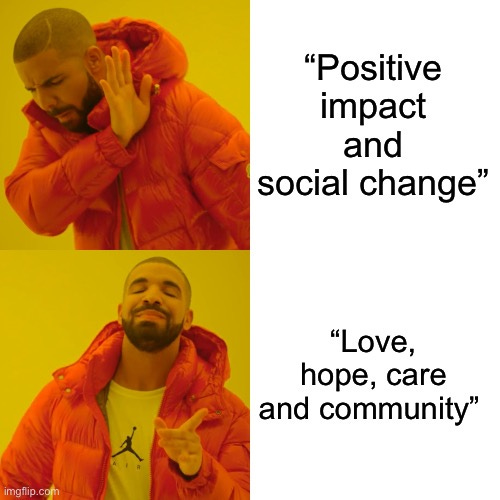
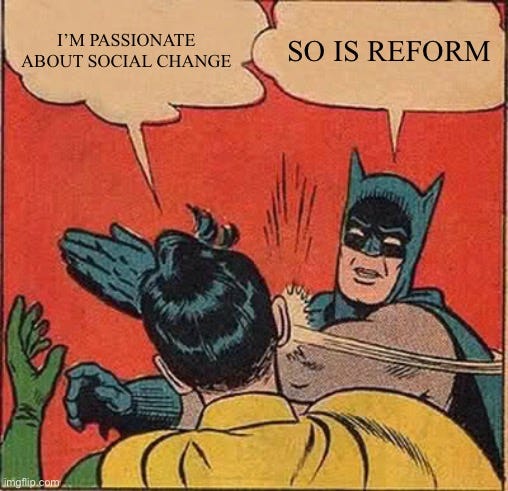

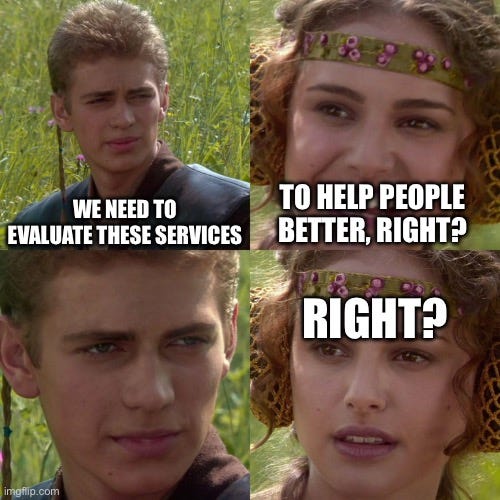
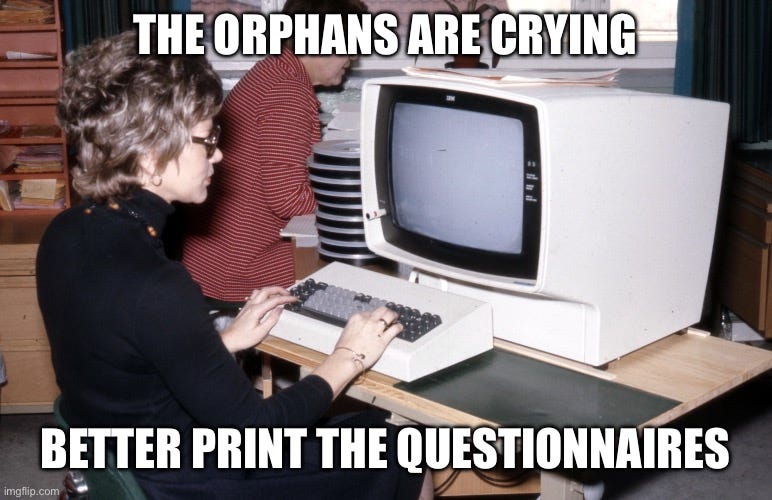
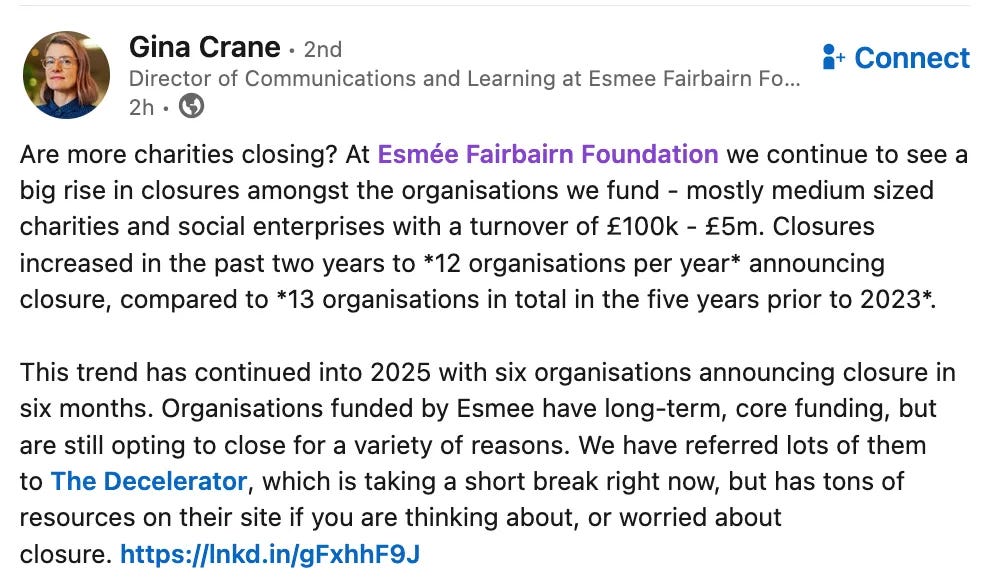






Another great article - thank you! As a 'translator' ie consultant, I hope I have always managed to include the emotions & the 'own words' of those in the charities / SEs I work with, alongside the 'impact' language. But this has made me think about the importance of making sure I do. And I really hope this is changing from the funder / commissioner end too.
I give software support for special schools in assessing the progress the pupils/students are making. At its most basic, targets are set and their progress is measured against those targets. However when reporting on their progress these assessments are only indicators. As special schools are particularly child focused (mainstream schools less so) each child is ultimately assessed holistically. As some pupils make almost imperceptable progress (or regression), feedback necessarily emphasises their emotions and wellbeing.
In reading about the language of care I couldn't help feeling how the language reflected attitudes and approaches and that instead of trading 'impact' against 'feeling cared for', the two could be combined. In other words, can we live with using impact as an assessment but not allow it to stand alone or even relegate it to being secondary or tertiary?